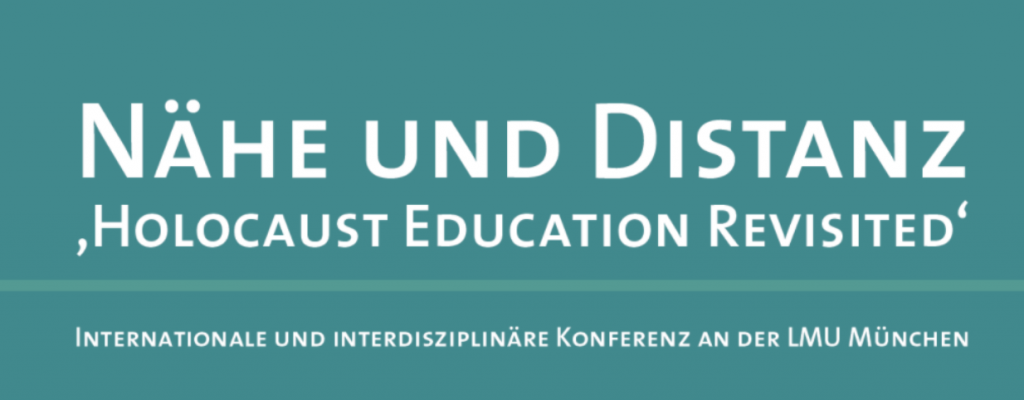“A Holocaust video game!” exclaimed the man sitting to my left with an alarmed look on his face. Professor Wulf Kansteiner, in a keynote address, had just suggested both the inevitability and the necessity of such a video game in his argument for expanded tolerance towards the shifting nature of Holocaust narratives in societal consciousness and education. Indeed, half the audience gathered at the three-day Holocaust education conference, “Near but Far: Holocaust Education Revisited,” in Munich, Germany seemed incensed by the idea of a video game about the Holocaust. The other half – a mix of professors, teachers, and site educators – nodded their heads, if not in approval, perhaps knowing that the future of Holocaust education, as outlined by Kansteiner, is already emerging. Indeed, such games are making a tentative foray into an industry whose revenues have surpassed those of the movie industry for more than a decade.
The conference, part of a larger project exploring contemporary trends in Holocaust education in Germany and beyond, hosted researchers and practitioners from all over the world at Ludwig-Maximilians University. Throughout the conference, familiar tensions emerged between the particularity and sanctity versus the universality and normalization of the Holocaust in public consciousness and education. By and large, the German academics and teachers seemed more conservative in their approaches to Holocaust education, resisting trends towards de-contextualization and dehistoricization, while American colleagues seemed more willing to embrace shifting Holocaust narratives, which, on more than one occasion, were described as part of the “Americanization” of the Holocaust.
Perhaps most provocative were the sessions exploring how technology is changing how students learn about the Nazi atrocities. With a note of caution, treading a middle ground between his German and U.S. colleagues, Canadian Professor Scott Murray reviewed current practices in Holocaust testimony. Murray challenged participants to think about the ethical and moral questions raised by the Shoah Foundation’s New Dimensions in Testimony Project. The program creates interactive avatars of Holocaust survivors, which are capable of responding to students’ questions. Many attendees wondered if the Shoah Foundation’s interactive avatars would soon replace practices of bringing survivors to visit classrooms or taking students to sites like the Dachau Concentration Camp Memorial Site and the Munich Documentation Center for the History of National Socialism.
Highlighting the power of survivor testimony, Abba Naor, a Holocaust survivor living between Israel and Germany, spoke to a rapt audience, including many students from the university’s pedagogy department. Following his moving talk, German students in the audience pressed Naor about his relationship with Germany and the Germans. Noar spoke neither of animosity nor goodwill, but rather of a complicated relationship and an overwhelming compulsion to share his personal story with students. After attending many sessions over the three days of the conference that effectively explored the nuances of Germany and Germans’ complicated relationships with the Holocaust, Naor’s story and comments on his own relationship to Germany seemed to ground such research. Naor, who will soon turn 90 years old, further highlighted the nearing moment when survivors will have all passed away.
As a new Ph.D. student just beginning my studies, Near but Far: Holocaust Education Revisited, helped highlight the tensions and directions within the growing field of Holocaust education. Colleagues from Spain, Israel, Brazil, and India demonstrated the differences in national approaches to Holocaust education, but also the increasing number of similarities as the effects of globalization assert themselves on the field. Despite much talk of the collapse of the Eastern Bloc and the developments within Holocaust studies in the ensuing almost 30 years since the end of the Cold War, interestingly, yet perhaps unsurprisingly, few sessions made any mention of the Holocaust in the East, the so-called “Holocaust by bullets.” Poland’s recent Holocaust legislation, criminalizing any speech that implicates Poles in the murder of Jews, further highlights the need for research into the Holocaust and Holocaust education in Eastern Europe.
George Dalbo is a Ph.D. student in Social Studies Education at the University of Minnesota with research interests in Holocaust, comparative genocide, and human rights education in secondary schools. Previously, he was a middle and high school social studies teacher, having taught every grade from 5th-12th in public, charter, and independent schools in Minnesota, as well as two years at an international school in Vienna, Austria.


Comments